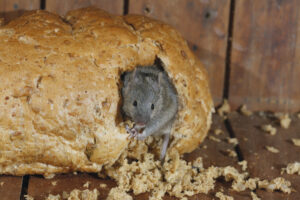
Mice Pest Control
Mice infestations can be a persistent and troublesome problem. These small rodents are not only a nuisance but can also cause damage to property and pose health risks. Mice pest control is even more important in winter. As the weather cools, rodents start looking for somewhere warm to live!
Understanding the Risks
Mice are more than just an annoying presence in your home. They can chew through electrical wiring, insulation, and even structural materials, leading to potential fire hazards and costly repairs. Even worse, mice can carry diseases, including Hantavirus and Salmonella, which can be transmitted to humans through contact with their droppings, urine, or saliva! Prompt and efficient mice pest control is essential to safeguard your property and protect your health.
Identifying Signs of Infestation
The first step in addressing a mice problem is to recognize the signs of their presence. Look out for the following indicators:
- Droppings -mice droppings resemble small, dark pellets and are often found near food sources, in cupboards, or along baseboards.
- Gnaw marks – mice have a constant need to gnaw on objects to keep their teeth from overgrowing. Look for chewed wires, furniture, or other items.
- Squeaking or scurrying sounds -mice are most active at night, and you may hear scrabbling or scurrying noises coming from walls, ceilings, or attics.
- Nests -mice create nests using shredded materials like paper, fabric, or insulation. Look for these in hidden areas such as attics, basements, or behind appliances.
Effective Mice Pest Control Strategies
- Seal entry points – mice can enter through small cracks and gaps in your home’s exterior. Seal these entry points using caulk, steel wool, or other appropriate materials so they can’t get in.
- Remove food sources – mice are attracted to easily accessible food. Store food in airtight containers, clean up spills promptly, and regularly empty bins.
- Declutter and organise – remove clutter from your home, especially in areas like basements and attics, as mice are more likely to nest in such spaces. Organise stored items in sealed plastic containers.
- Set traps – various types of traps are available, including snap traps and humane traps. If you’re game, place them along walls, near suspected entry points, or in areas where signs of mice activity are prominent.
- Use natural deterrents – peppermint oil, cloves, or mothballs are known to repel mice due to their strong scent. Place these deterrents in areas where mice are likely to frequent.
And finally – consult the professionals!
If you’ve been unsuccessful in your efforts, or don’t want to deal with this yourself, call the professionals at Sunnystate Pest Control. We have the expertise and experience to assess the situation, implement targeted treatments, and provide long-term solutions.

